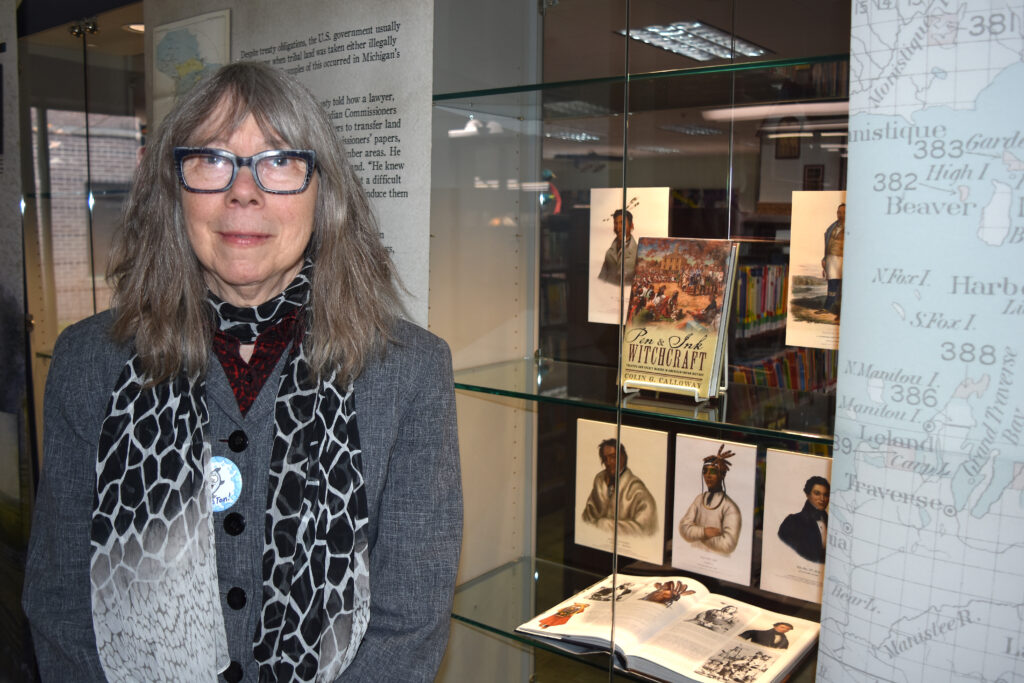
Oxford Library exhibit, programs now through March
By Don Rush
Oxford Library Director Bryan Cloutier and Jaema Berman, head of Adult Services at the library started planning out 2023’s programs for the library and both thought the time was right for a themed winter. From now, through March the library, 530 Pontiac Street, will host an exhibit titled, Native Treaties, Shared Rights. In conjunction with the exhibit, the library has planned six programs revolving around Native American history in and around the Great Lakes.
“We discussed an exhibit we wanted to present the theme of Michigan Native American history,” Berman said. “We felt the time was ripe for discussion right now. The timing was good and we were able to share the Native Treaties, Shared Rights exhibit from Clarke Historical Library.”
Part of the exhibit on display at the library are about two dozen portraits of Native Americans who actually signed most of the treaties, artifacts, maps and all the books on Native American history, Native Americans in Michigan the library already had in its collection.
“We know that the United States government signed over 300 treaties with Indigenous Tribes between 1788 and 1871. Many of those treaties were broken and failed,” Berman said. “We are seeing more Native American stories in the media, on television and more books. And, what we are seeing is very inspiring. I really believe history shows us the way to live now and how to understand the past so we don’t repeat the past. I think that’s one of the roles of a public library is education, understanding our history and sharing ideas.”
Berman finds the history fascinating.
“One of the interesting things is there were lots of tribes in Michigan, with the three main ones being the Chippewas (Ojibwa), the Odawa and Potawatomi. They had their own relationship and partnership called 3 Fires and they refer to themselves as Anishinaabe, which means ‘original people.’ The United States government treated each one of those tribes as independent, self-ruling governments. That’s why there are so many treaties and unfortunately so many of those treaties, well just became inconvenient (to the United States),” she said.
Presentations to go along with the exhibit starts tonight (Jan. 11) at 7 p.m. Al and David Eicher will present “Indian History of Southeastern Michigan.” Next Wednesday (Jan. 18), at 7 p.m. Dr. Nicholas DiPucchio from Oakland University will present “Native Treaties in the Great Lakes Region.” The talk will “explore how … treaties exploited Indigenous nations and how the Anishinaabe and Wyandot peoples adapted to early U.S. expansion.”
On Feb. 1, Audrey Geyer, an independent documentarian, will present her one-hour film, “Warrior Lawyer,” about contemporary Native American role models, nation rebuilding, tribal justice and cultural revitalization. On Feb. 8, Oxford’s own Jeff Morrison will present “Native American Themes and Symbolism in Michigan Architecture. Both these programs start at 7 p.m.
Historian and naturalist Randy Baker comes to the library on Feb. 17 at 7 p.m to the library with artifacts and materials from 600 to 12,000 years ago to “develop a better understanding of what life was like for the 3-Fires and other Native American Nations that used Michigan’s natural resources in their everyday lives.”
The programming ends on St. Patrick’s Day (March 17) when Leslie Pielack, Director of Birmingham Museum, visits for a “fireside chat” about “the story of the ancient path that transformed early Michigan and of the people whose lives intertwined on the iconic road,” known as Woodward Ave. This program starts at 2 p.m.
Registration is required and that can be done by calling 248-628-3034 or by going to the library’s website and registering, www. MiOPL.org.
“People are already signing up,” she said.

Leave a Reply